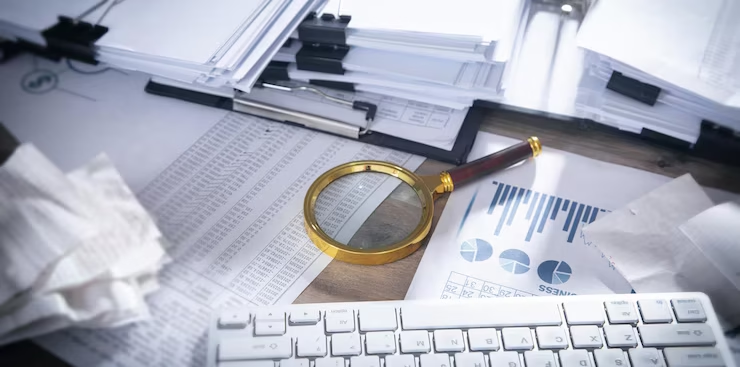Why Forensic Accounting Audits Key to Unlocking Financial Success
Introduction
In the world of financial audits, forensic accounting audits stand out as a crucial tool for uncovering financial discrepancies, fraud, and mismanagement. These specialized audits are designed to dig deeper into financial records to identify irregularities that can potentially harm an organization’s financial health. As businesses and individuals alike become more aware of the importance of securing their financial assets, forensic accounting audits offer peace of mind.
What sets forensic accounting audits apart from standard audits is the level of detail and scrutiny involved. These audits are not just about checking compliance with financial regulations; they delve into the reasons behind any irregularities, fraud, or financial inconsistencies. For businesses looking to prevent financial fraud or seeking clarity in their financial records, forensic accounting is an invaluable asset.
But what does this have to do with securitization loan audits? Forensic accounting and securitization loan audits are interconnected. Securitization loan audits help assess the underlying loans in a financial portfolio, identifying potential risks, fraudulent activities, or mismanagement. This makes forensic accounting an essential tool in ensuring the transparency and integrity of securitized assets. Let’s explore the critical role that forensic accounting audits play in financial stability and security.
What is Forensic Accounting and How Does It Work?
Forensic accounting is a specialized branch of accounting that focuses on investigating and analyzing financial data to uncover discrepancies, fraud, or embezzlement. This field combines accounting expertise with investigative skills to provide a thorough examination of financial statements, transactions, and business practices. Forensic accountants work closely with law enforcement agencies, legal teams, and financial institutions to uncover fraud and financial misconduct.
A forensic accounting audit often involves:
- Reviewing accounting systems and records
- Identifying patterns or inconsistencies in financial transactions
- Tracing assets and liabilities
- Reconstructing financial data to determine the cause of discrepancies
- Preparing reports that are admissible in court or legal proceedings
These audits can be used in a variety of scenarios, such as divorce settlements, bankruptcy proceedings, fraud investigations, and, most importantly, for assessing financial stability in loan portfolios.
The Importance of Securitization Loan Audits
Securitization loan audits are an essential part of understanding the health of a financial portfolio, especially when it comes to asset-backed securities. Securitization refers to the process of pooling various types of debt—including loans—and converting them into securities that can be sold to investors. These securities are backed by the underlying loans, and their value depends on the performance of these loans.
A securitization loan audit helps to assess:
- The validity of the loans in the securitized pool
- The accuracy of loan servicing
- Whether the loan servicers are adhering to the terms of the agreements
- If any mismanagement, fraud, or discrepancies are present
By performing a comprehensive audit of securitized loans, businesses, investors, and homeowners can gain insight into the risks and potential financial threats that may be hidden in loan portfolios.
How Forensic Accounting Enhances Securitization Loan Audits
The intersection of forensic accounting and securitization loan audits provides a powerful mechanism for identifying fraud and ensuring financial transparency. A forensic accountant plays an instrumental role in scrutinizing loan documentation, verifying the authenticity of the assets, and detecting any irregularities in the securitization process.
For example, forensic accountants can look for:
- Misstated loan values
- Undisclosed fees or charges
- Inaccurate or fraudulent loan servicing practices
- Evidence of intentional misrepresentation of loan terms
Through these efforts, forensic accounting ensures that all parties involved in the securitization process are fully informed and protected against potential financial risks. By thoroughly reviewing financial records, forensic accounting audits provide deeper insights that are critical for protecting investors and borrowers alike.
Benefits of Forensic Accounting Audits for Investors and Borrowers
For both investors and borrowers, forensic accounting audits offer significant advantages. For investors, these audits provide the clarity needed to make informed decisions about purchasing or holding asset-backed securities. They help identify any potential red flags or risks that could impact the value of the securities.
For borrowers, particularly those involved in mortgage-backed securities or other loan-backed investments, forensic accounting audits can uncover mistakes or mismanagement that could lead to unjustified financial loss. Additionally, if a borrower is involved in a legal dispute, forensic accounting can provide the evidence needed to resolve the case.
Here’s how forensic accounting can benefit different stakeholders:
- Investors: Gain insight into the underlying value of securitized assets and identify hidden risks.
- Borrowers: Ensure they are not paying excessive fees or dealing with fraudulent loan practices.
- Financial Institutions: Enhance the integrity of their loan portfolios and reduce exposure to risky assets.
- Legal Teams: Provide evidence for litigation and dispute resolution.
In all these cases, forensic accounting audits provide the transparency and security that are crucial for financial success and stability.
Securitization Loan Audits: A Critical Step for Mortgage Audits
Mortgage audits are a prime example of how forensic accounting and securitization loan audits work together. For homeowners or real estate investors, securitization loan audits can uncover whether their mortgage was properly securitized, whether the loan servicer has followed the correct procedures, and if there are any irregularities in how the loan is being serviced.
In cases where homeowners have been subjected to unfair lending practices, a forensic accounting audit can reveal key information that can be used in legal claims or for negotiations with lenders. By scrutinizing every detail of the mortgage loan’s documentation, forensic auditors can identify issues that could lead to loan rescission or other remedies.
Preventing Financial Fraud: The Role of Forensic Accounting in Loan Securitization
Fraud prevention is one of the most important aspects of forensic accounting audits. In the context of loan securitization, fraud can occur at various stages, from the origination of loans to their securitization and eventual sale to investors.
Forensic accountants work diligently to uncover:
- Fraudulent Loan Origination: Where loans are created with false or misleading information.
- Improper Loan Servicing: Where payments or fees are mishandled, leading to incorrect balances or overcharging.
- Misrepresentation of Securities: When the value of the loan-backed securities is inflated to attract investors.
By investigating and uncovering such fraudulent activities, forensic accounting ensures that securitized loans maintain their integrity and that investors are not misled by inflated values or hidden risks. This is critical for maintaining a fair and transparent market, where all parties can trust that the financial instruments they are dealing with are legitimate and secure.
The Growing Need for Forensic Accounting Audits in Today’s Financial Environment
The financial landscape has become increasingly complex, with more investors, institutions, and borrowers involved in sophisticated financial products such as asset-backed securities and mortgage-backed securities. As a result, the need for forensic accounting audits has never been greater.
In recent years, there has been an increasing awareness of the risks associated with financial mismanagement and fraud, particularly in the context of securitization. With a forensic accounting audit, organizations can rest assured that their financial portfolios are being thoroughly vetted for any hidden threats.
How To Conduct a Forensic Accounting Audit for Securitized Loans
Conducting a forensic accounting audit on securitized loans involves a comprehensive approach. Here’s a general outline of the process:
- Data Collection and Analysis: Gather all relevant documents, including loan agreements, payment histories, and securitization contracts.
- Loan Verification: Confirm the authenticity of each loan in the securitization pool by cross-referencing loan documents with payment histories and other related data.
- Fraud Detection: Examine for any signs of fraudulent activity, including misrepresentation of loan values, incorrect servicing, or undisclosed fees.
- Reporting: Prepare a detailed forensic accounting report that outlines the findings and provides actionable recommendations.
By following these steps, forensic accountants can provide a thorough evaluation of the securitized loans, offering transparency and reducing the risk of financial loss.
Why Forensic Accounting Audits Are Essential for Financial Security
In an increasingly complex financial world, forensic accounting audits are essential for maintaining financial security. By conducting thorough investigations into loan portfolios and identifying any discrepancies or fraudulent activities, forensic accountants ensure that all parties involved in securitization can have confidence in the financial instruments they are dealing with.
Forensic accounting audits offer the transparency and security that businesses, investors, and borrowers need to make informed decisions. They are vital for uncovering hidden risks, preventing financial fraud, and ensuring compliance with regulations. Without these audits, financial institutions, individuals, and organizations could be exposed to significant financial risks.
Conclusion:
Forensic accounting audits play an integral role in uncovering financial fraud and ensuring the integrity of loan portfolios. When combined with securitization loan audits, these audits provide a deeper understanding of the risks and potential pitfalls in the financial world. If you are an investor, borrower, or financial institution, it is crucial to engage in these audits to secure your financial future.
To learn more about forensic accounting audits and how they can help protect your financial interests, contact us today at (877)-399-2995 or visit Mortgage Audits Online to learn more. Secure your financial future with confidence!







